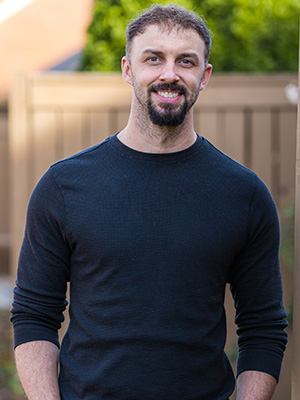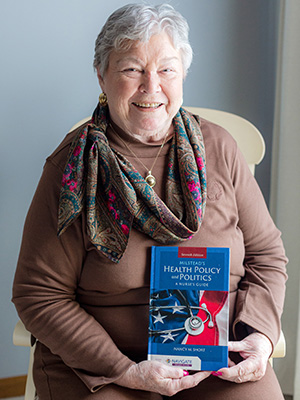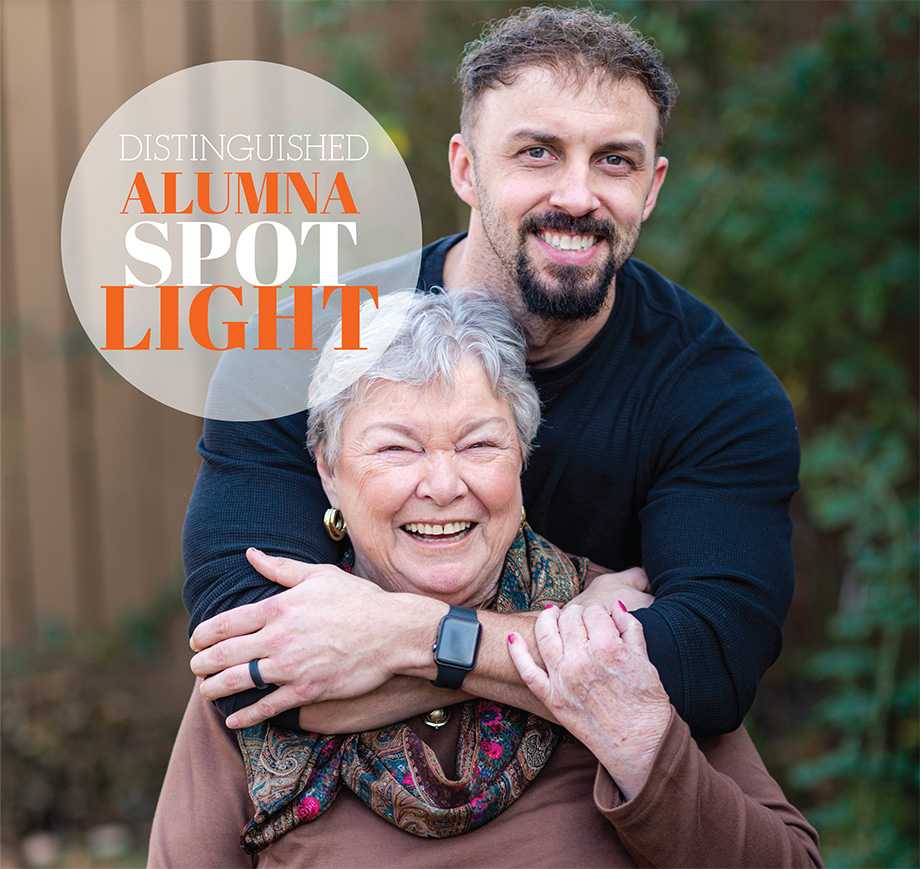Mount Carmel alumna Jeri Milstead ‘57, PhD, RN, NEA-BC, FAAN, ANA Hall of Fame, is a legend in nursing and health care public policy. To George Biddle ’13, BSN, RN, she is grandma. Although separated by a generation, they are both grounded in the educations they received – decades apart – at Mount Carmel.
Dr. Milstead, a Distinguished Alumna who served on the MCCN Board of Trustees for nine years, earned her nursing diploma from the School of Nursing in 1957. She went on to earn her BS and MS in nursing from The Ohio State University. Her doctorate in political science from the University of Georgia was completed while she taught at Clemson University.
Biddle earned his bachelor’s degree in communications and business from Eastern Michigan University and his BSN through the Second Degree Accelerated Program (SDAP) at MCCN.
While each took different paths, they are both clearly devoted to nursing.

In a May 2020 Newark Advocate article, journalist Kurt Snyder wrote, “A loaded Newark Catholic lineup from top to bottom always had George Biddle on its side. The right-hander was instrumental in leading the Green Wave to the first two of three consecutive Division IV state titles," in an article reminiscing about the 2003 season.
A star baseball pitcher at Newark Catholic High School, Biddle played at Eastern Michigan and then went pro for two years with the Kansas City Royals organization. He entered the SDAP program at age 26 and, after completing the 13-month, intensive course of study, began his career as an ER nurse at Mount Carmel West.
Biddle’s focus on a health care profession began in a rather unconventional way. He was fascinated by the television program House, and all of the technical language and procedures it depicted. “I used to watch episodes non-stop,” he said.
Nursing does seem to run in the family, though, so his entrance into the profession may have been inevitable. His grandmother and his sister are nurses. Of course, when it was time to identify a program, he discussed it with Milstead.
Her experience at Mount Carmel and familiarity with the SDAP led her to recommend it to her grandson. “He lived here, with me, while he was in the SDAP program,” said Milstead. “But I hardly saw him. He would come out for dinner, then head right back to studying after that.”
“It’s an intense program, not something I think I would have been ready for right out of high school,” said Biddle. “Some of the best parts of the program were how accessible the faculty were, the instruction and testing were very good, and it has a really high pass rate.”
Biddle’s father passed away suddenly while he was a student at MCCN. He went to class the next day. “Not everyone would do that, but I felt like I should be there, rather than at home, simply grieving,” he said. He recounted that tough day and the tears shed in class, but pushed through to continue in the program, a testament to his resilience, no doubt built through the ups and downs of high school, college, and professional sports, which likely taught him to fight through adversity. His dad, who also was his long-time coach, would have been proud of his son’s perseverance.

Dr. Jeri Milstead is the founding editor and senior author of Milstead’s Health Policy and Politics, a Nurses Guide, 7th ed (2022) that is sold in 22 countries. She has contributed policy chapters in four other current nursing textbooks and national and international journals.
Among the many Sisters who exemplified the first goal was Sister M. Josina, a nursing school graduate who became a nursing supervisor and member of the pastoral care department. At her retirement in 1976, The Catholic Times recognized her for a After graduation, and his initial work at Mount Carmel West, Biddle headed to Ohio State’s Wexner Medical Center, first in the PCU, then to the ER, his first-choice practice location. The pandemic saw him volunteer to do COVID-19 testing in Ohio’s prisons. “We tested 1,200 people on the first day and 1,800 on the next day,” he said. “What we found out was that these prisons, one in Marion, Ohio, was the most active COVID hot spots in the country, with an 80% or so positivity rate among inmates.”
“He will volunteer for any opportunity,” said Milstead. “Taking full advantage of what might come your way is a good way to approach a nursing career.” She certainly took that tact, teaching and leading at Clemson University, Duquesne University, and as Dean, University of Toledo College of Nursing. She retired from Toledo in 2008, and remains interested and active in health care public policy as it pertains to nursing.
Milstead recently noticed arts and humanities were not required content in nursing education in Ohio. “I wrote the Board of Nursing a letter sharing why we still need to include those subjects in nursing education. It’s really what sets us apart from medicine and pharmacy. We just can’t do without ethics, social justice and other related subject matter that is learned through the arts and humanities, not the sciences,” she said.
“That’s a good lesson for today’s nursing students, too,” said Milstead. “Don’t forget the humanity of nursing. There is so much more technology in today’s nursing. Never forget that there’s a patient under all that who needs a human touch.”
Biddle added, “Education is important, so you have to keep working to stay on top of things. Things can get routine for you, but don’t take shortcuts. And developing the ability to handle whatever comes up is key. Remember, patients are someone’s mom, brother, or friend. I would love to see more guys in nursing because I think they bring a unique perspective to the health care setting.”

